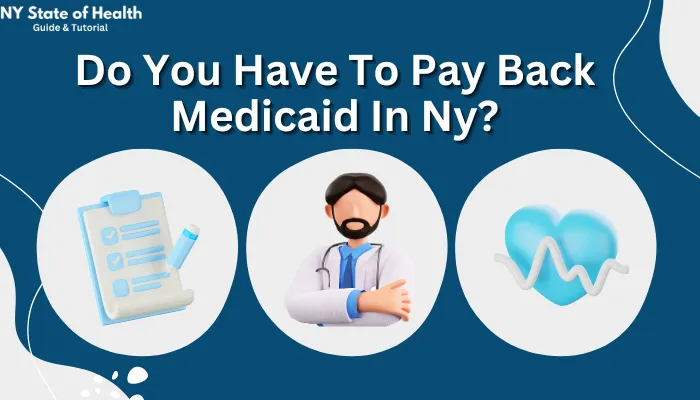Despite being a lifeline to many who can hardly afford it, one commonly raised query is: Do you have to pay back Medicaid in NY? Medicaid, an important program in New York State, provides health insurance for low-income people and families.
This all-inclusive guide focuses on the topic of repaying Medicaid in New York dispelling myths, giving possible situations that may arise and offering ways to navigate through such repayment obligations.

Understanding Medicaid
Medicaid is a government-funded medical cover that is funded jointly by the federal government and individual states.
In this state, it ensures comprehensive health care coverage for beneficiaries including doctor’s visits, hospital stays, prescribed medicine as well as other types of medical services among others.
Key points about Medicaid in New York are discussed below:
- Who Can Get It? – The eligibility requirements are based on income levels, family size or composition, citizenship/immigration status and certain disability criteria.
- Benefits – Medicaid has many benefits so that citizens can get the necessary treatment options.
- Importance – For most people in NYC the Medicaid Act is what they base their health coverage security on.
Understanding Medicaid Coverage and Repayment
Even though there is substantial financial assistance from Medicaid at times reimbursement might be required. The following breakdown reveals how exactly coverage by -and payment from -Medicaid works;
Medicaid Coverage
- Enrolled persons receive healthcare under a wide-ranging array of programs covered by Medicaid.
- Medicaid typically pays healthcare providers directly for services rendered that are covered.
Potential Repayment Scenarios
- Medicaid Estate Recovery (MERP): Similar to most states within America, New York operates MERP where recuperation for services offered during the deceased patient’s illness could be claimed against his/her estate.
- Incorrect Eligibility Determination: Inaccurate eligibility determination can lead to a request for reimbursement in instances where a recipient was mistakenly found eligible for Medicaid on grounds of errors or false information given by the applicant.
- Fraudulent Activities: If one intentionally gives wrong information concerning himself/herself to benefit from Medicaid, there may be penalties and claims for refunds.
Important Clarification: However, not every Medicaid patient is obliged to repay their medical expenses. It’s important to know when such obligations have to be fulfilled.
Unveiling the Medicaid Estate Recovery Program (MERP)
MERP is a program that seeks to recover the costs of benefits provided through Medicaid from an individual’s estate after he/she dies. Here’s what MERP in New York entails:
- Criteria for Estate Recovery – Basically, MERP takes effect on those individuals who are over 55 years old and had long-term care services mostly provided at nursing homes while they were covered under Medicaid.
- Recoverable Assets – Probate assets like bank accounts, real property (except primary residence with certain restrictions) and shares can only be recouped in specific cases.
Table 1: Recoverable and Non-Recoverable Assets under NY’s MERP
| Recoverable Assets | Non-Recoverable Assets |
|---|---|
| Bank accounts | Primary residence (up to a certain equity limit) |
| Real estate (excluding primary residence) | Household items and personal belongings |
| Stocks and bonds | Life insurance benefits (with certain exceptions) |
| Retirement accounts (with limitations) | Vehicles (up to a certain value) |
- Exceptions and Exemptions: Under certain conditions, surviving spouses, minor children and disabled persons residing within the home might not be subjected to MERP claims.
- Minimizing Estate Recovery: Preserving your estate includes gifting your assets according to law or buying Medicaid-compliant annuities to reduce the estate value and lessen the chances of any MERP claim.
Addressing Common Misconceptions
Medicaid repayment is surrounded by many misconceptions. Below are some common myths associated with it and the real situation:
- Myth 1: All Medicaid Recipients Must Repay Benefits:
False. Nevertheless, a payback is necessary in specific conditions such as MERP or cases of fraud and disqualification. - Myth 2: Medicaid Recipients Can Never Own Property or Assets:
Not true. However, some exemptions apply to MERP where Medicaid recipients can own selected assets. Some strategies can be employed to safeguard these resources while at the same time qualifying for Medicaid. - Myth 3: Medicaid Repayment Will Leave Beneficiaries Destitute:
False. But MERP claims only target the estate’s value, not the survivors’ spouse’s or dependent children’s means. There are safeguards in place to ensure no undue financial burden.
Navigating Medicaid Repayment in New York
This is if you are on Medicaid or have concerns about possible future repayment obligations you should know:
- Understanding Your Repayment Obligations: It is important to contact your local Medicaid caseworker or an elder law attorney to understand your case and potential repayment scenarios before consulting on this issue.
- Resources Available: Furthermore, you might want to visit the New York State Department of Health website which has resources about Medicaid including information concerning MERP. In addition, legal aid organizations and elder law attorneys can give personalized advice regarding how best to navigate around potential repayment situations you may experience.
- Seeking Legal Assistance: The guidance of a Medicaid-specialized elder law attorney is imperative. They can help you understand your rights, look into planning options to minimize estate recovery and represent you if it’s necessary to do so.
- Staying Informed: Medicaid policies and regulations change. You need to subscribe for updates from the New York State Department of Health or contact legal professionals to remain current on changes that could affect your circumstances.
Real-Life Examples
Do You Have To Pay Back Medicaid In NY? It is important to know how other people are repaying Medicaid benefits in reality. Here are some anonymized case studies:
- Case Study 1: Sarah, an octogenarian spinster, was provided with Medicaid-funded nursing home care for many years. When she died, her estate (minus her primary residence) had been claimed by the state as payment for some of the healthcare coverage supplied. Subsequently, her niece who inherited the rest of the assets went ahead and consulted an advocate to ensure that she had enough money set aside for personal use when needed.
- Case Study 2: As a widower with a young daughter, John received medical assistance from Medicaid due to his chronic illness condition. For this reason, he visited an elder law attorney who advised him on gifting strategies that would reduce MERP implications on his daughter’s inheritance while still maintaining eligibility for Medicaid.
These examples highlight why understanding your position, exploring alternatives and perhaps getting legal assistance may be essential in navigating through the intricacies of making proper repayments under Medicaid.
Conclusion
Do you have to pay back Medicaid in NY? The response differs depending on the conditions of this particular case. This manual aims to enlighten you about Medicaid, scenarios when you will be required to reimburse and resources that can help you navigate through such liabilities if there are any.
By knowing what your rights are and embracing various plans, an individual can approach Medicaid cautiously. Note however that one could benefit greatly from legal or financial counsellors regarding their Medicaid coverage as a means of minimizing potential repaying cases. It is important to get help and stay updated to make appropriate decisions about the security of your health care.
